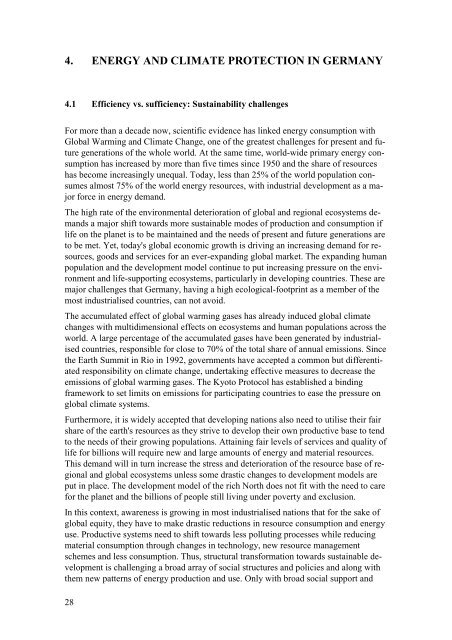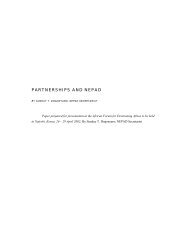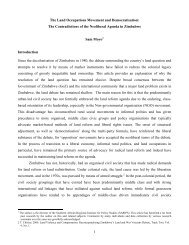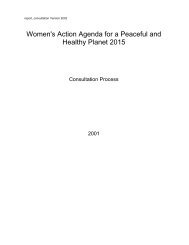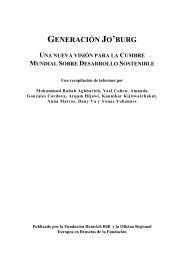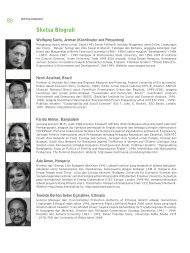Sustainable Germany: A View from the South; July 2002 -- pdf
Sustainable Germany: A View from the South; July 2002 -- pdf
Sustainable Germany: A View from the South; July 2002 -- pdf
Create successful ePaper yourself
Turn your PDF publications into a flip-book with our unique Google optimized e-Paper software.
4. ENERGY AND CLIMATE PROTECTION IN GERMANY<br />
4.1 Efficiency vs. sufficiency: Sustainability challenges<br />
For more than a decade now, scientific evidence has linked energy consumption with<br />
Global Warming and Climate Change, one of <strong>the</strong> greatest challenges for present and future<br />
generations of <strong>the</strong> whole world. At <strong>the</strong> same time, world-wide primary energy consumption<br />
has increased by more than five times since 1950 and <strong>the</strong> share of resources<br />
has become increasingly unequal. Today, less than 25% of <strong>the</strong> world population consumes<br />
almost 75% of <strong>the</strong> world energy resources, with industrial development as a major<br />
force in energy demand.<br />
The high rate of <strong>the</strong> environmental deterioration of global and regional ecosystems demands<br />
a major shift towards more sustainable modes of production and consumption if<br />
life on <strong>the</strong> planet is to be maintained and <strong>the</strong> needs of present and future generations are<br />
to be met. Yet, today's global economic growth is driving an increasing demand for resources,<br />
goods and services for an ever-expanding global market. The expanding human<br />
population and <strong>the</strong> development model continue to put increasing pressure on <strong>the</strong> environment<br />
and life-supporting ecosystems, particularly in developing countries. These are<br />
major challenges that <strong>Germany</strong>, having a high ecological-footprint as a member of <strong>the</strong><br />
most industrialised countries, can not avoid.<br />
The accumulated effect of global warming gases has already induced global climate<br />
changes with multidimensional effects on ecosystems and human populations across <strong>the</strong><br />
world. A large percentage of <strong>the</strong> accumulated gases have been generated by industrialised<br />
countries, responsible for close to 70% of <strong>the</strong> total share of annual emissions. Since<br />
<strong>the</strong> Earth Summit in Rio in 1992, governments have accepted a common but differentiated<br />
responsibility on climate change, undertaking effective measures to decrease <strong>the</strong><br />
emissions of global warming gases. The Kyoto Protocol has established a binding<br />
framework to set limits on emissions for participating countries to ease <strong>the</strong> pressure on<br />
global climate systems.<br />
Fur<strong>the</strong>rmore, it is widely accepted that developing nations also need to utilise <strong>the</strong>ir fair<br />
share of <strong>the</strong> earth's resources as <strong>the</strong>y strive to develop <strong>the</strong>ir own productive base to tend<br />
to <strong>the</strong> needs of <strong>the</strong>ir growing populations. Attaining fair levels of services and quality of<br />
life for billions will require new and large amounts of energy and material resources.<br />
This demand will in turn increase <strong>the</strong> stress and deterioration of <strong>the</strong> resource base of regional<br />
and global ecosystems unless some drastic changes to development models are<br />
put in place. The development model of <strong>the</strong> rich North does not fit with <strong>the</strong> need to care<br />
for <strong>the</strong> planet and <strong>the</strong> billions of people still living under poverty and exclusion.<br />
In this context, awareness is growing in most industrialised nations that for <strong>the</strong> sake of<br />
global equity, <strong>the</strong>y have to make drastic reductions in resource consumption and energy<br />
use. Productive systems need to shift towards less polluting processes while reducing<br />
material consumption through changes in technology, new resource management<br />
schemes and less consumption. Thus, structural transformation towards sustainable development<br />
is challenging a broad array of social structures and policies and along with<br />
<strong>the</strong>m new patterns of energy production and use. Only with broad social support and<br />
28


